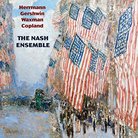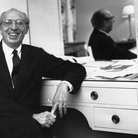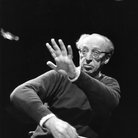How To Buy Aaron Copland’s Appalachian Spring
It would be cute to think that Aaron Copland was depicting spring in the Appalachian mountains of North America. But sadly he wasn’t, as the work was completed long before the title was assigned.
Originally known as Ballet For Martha, it was commissioned in 1943 by the arts patron Elizabeth Sprague Coolidge to be performed by a chamber group and Martha Graham’s Dance Troupe in New York. The title, Appalachian Spring, was chosen by Graham shortly before the premiere in October 1944 at the Library of Congress. She took the phrase from a poem by Hart Crane called The Dance.
The ballet is set in the early 19th century, in the grounds of a Pennsylvania farmhouse built for a newly married young couple.
Copland wrote, “The bride-to-be and the young farmer-husband enact the emotions, joyful and apprehensive, which their new domestic partnership invites. An old neighbour suggests, now and then, the rocky confidence of experience. A revivalist and his followers remind the new householders of the strange and terrible aspects of human fate. At the end the couple are left quiet and strong in their new house.”
The music ends with a set of variations on Simple Gifts, a hymn tune associated with the Shakers. Copland originally composed the ballet score for a chamber orchestra, but a year after its first performance he arranged it into a shorter suite for full orchestra.
Leonard Bernstein begins proceedings with the New York Philharmonic some 50 years ago. In extremely clear sound, he dispatches a thoroughly enticing performance. The fast sections with their jazzy rhythms are crisp and tightly controlled (as one might expect from Bernstein) and when the mood moves down a gear he is a picture of serenity.
As indeed he is in his later recording with the Los Angeles Philharmonic. Bernstein places special emphasis here on the lyrical aspects of this work. Slower sections are generally taken more expansively and with the LA orchestra possessing more finesse and style this allows for a reading of great depth and feeling. Another advantage of this recording is the finely focused sound engineering.
Sandwiched between these two full orchestral suites and two of the complete ballet is a suite based on the original chamber version, made to enable the work to be performed in smaller halls.
The renowned conductor-less Orpheus Chamber Orchestra provides the entertainment, but because of its sparseness a short period of adjustment is required, as the reduced forces don’t quite produce the impact we are generally used to. However, it does allow us a bird’s eye view of the intricate scoring, with Simple Gifts being especially well articulated.
The closing pages of this version naturally lack the lusciousness of a full orchestra, something which the San Francisco Symphony under Michael Tilson Thomas has aplenty. And as enjoyable as the suite is, the full ballet provides a richer canvas and more drama. Climaxes are especially well judged by Tilson Thomas and there is clear evidence throughout the interpretation that a great affinity exists between the conductor and the orchestra.
It’s unfortunate that there are no individual track idents here though, unlike Leonard Slatkin’s version, which rounds up our survey with another desirable version of the full ballet. He is purposeful and assertive and draws some vivacious playing, especially when the action gets more animated. But at times the playing lacks the final polish of, say, the San Francisco or Los Angeles orchestras.
So a mixed bag of suites verses two full works then. If you only require the suite, then Bernstein’s recording from LA would be the preferred choice. But for those wishing to take in the complete experience then Tilson Thomas is your man – the pick of a very fruitful bunch.
THE RECORDING TO OWN
San Francisco Symphony/Michael Tilson Thomas
RCA RED SEAL: 82876658402
For years Bernstein held the key to this work, then along came MTT and snatched it from him. It may be with him for some considerable time!
ALSO CONSIDER…
■ New York Philharmonic/ Leonard Bernstein
SONY CLASSICAL SMK 63082
■ Los Angeles Philharmonic/Leonard Bernstein
DEUTSCHE GRAMMOPHON 477 6352
■ Orpheus Chamber Orchestra
BRILLIANT CLASSICS 9207
■ Saint Louis Symphony Orchestra/Leonard Slatkin
EMI 381 4982






